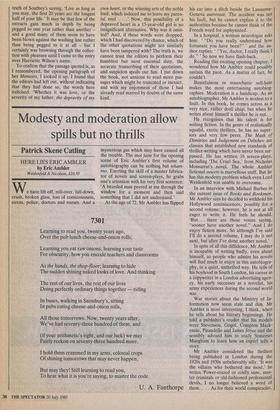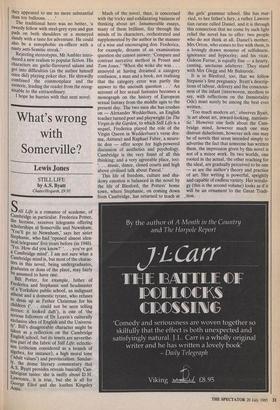Modesty and moderation allow spills but no thrills
Patrick Skene Catling
HERE LIES ERIC AMBLER by Eric Ambler
Weidenfeld & Nicolson, £10.95 mysterious gas which may have caused all
his car into a ditch beside the Lausanne- Geneva autoroute. The accident was not his fault, but he cannot explain it to the authorities because he cannot think of the French word for asphyxiated.
In a hospital, a woman neurologist asks him: ' "Do you really understand how fortunate you have been?" ' and the au- thor replies: "Yes, doctor, I really think I do." ' So now we have flash-back.
Reading this exciting opening chapter, I wondered how Mr Ambler could possibly sustain the pace. As a matter of fact, he couldn't.
Boastfulness or masochistic self-hate makes the most entertaining autobiog- raphies. Moderation is a handicap. As an autobiographer, Mr Ambler is modest to a fault. In this book, he comes across as a very nice, rather droll chap; but when he writes about himself a thriller he is not.
He recognises that his talent is for writing fiction. In the genre of realistically squalid, exotic thrillers, he has no super- iors and very few peers. The Mask of Dimitrios and Judgement on Deltchev are classics that established new standards of thriller-writing which have never been sur- passed. He has written 16 screen-plays, including 'The Cruel Sea,' from Nicholas Monsarrat's novel. The whole Ambler fictional oeuvre is marvellous stuff. But he has this modesty problem which even Lord Weidenfeld was unable to overcome.
In an interview with Michael Barber in the current issue of Books and Bookmen, Mr Ambler says he decided to withhold his Hollywood reminiscences, possibly for a second volume; however, he is not at all eager to write it. He feels he should, `But. . there are those voices saying, "sooner have another novel." And I do enjoy fiction more. So although I've said I'll do a second volume, I may do it not next, but after I've done another novel.'
In spite of all this diffidence, Mr Ambler is incapable of writing badly, even about himself, so people who admire his novels will find much to enjoy in this autobiogra- phy, in a quiet, unthrilled way. He tells of his boyhood in South London, his career as a copywriter in a London advertising agen- cy, his early successes as a novelist, his army experiences during the second world war.
War stories about the Ministry of In- formation now seem stale and dim. Mr Ambler is most interesting, I think, when he tells about his literary beginnings. He told a publisher's reader that his models were Stevenson, Gogol, Compton Mack- enzie, Pirandello and James Joyce and she sensibly advised him to study Somerset Maugham to learn how an expert tells a story.
Mr Ambler considered the thrillers being published in London during the 1920s and 1930s unbelievably silly. 'It was the villains who bothered me most,' he writes:Power-crazed or coldly sane, mas- ter criminals or old-fashioned professional devils, I no longer believed a word of them. . . As for their world conspiracies,
they appeared to me no more substantial than toy balloons. . .
The traditional hero was no better, 'a tweedy fellow with steel-grey eyes and gun pads on both shoulders or a moneyed dandy with a taste for adventure. He could also be a xenophobic ex-officer with a nasty anti-Semitic streak.'
Rejecting stereotypes, Mr Ambler intro- duced a new realism to popular fiction. His characters ate garlic-flavoured salami and got into difficulties (as the author himself once did) playing poker dice. He shrewdly combined the commonplace and the esoteric, leading the reader from the recog- nisable to the extraordinary. I hope he hurries with that next novel.



















































 Previous page
Previous page